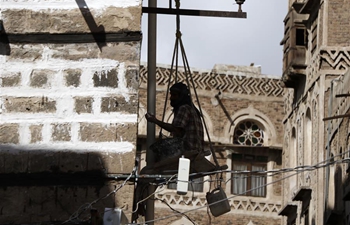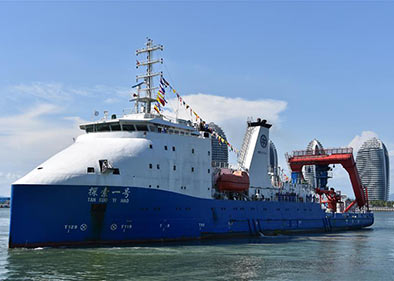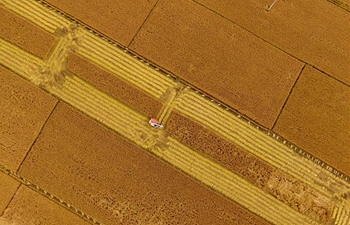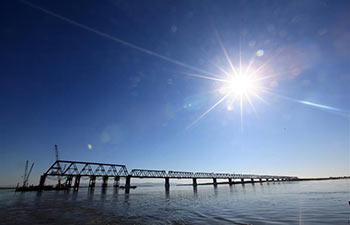
China's Vice Finance Minister Yu Weiping (C, front) attends the Asia-Pacific Economic Cooperation (APEC) Finance Ministers Meeting held in Port Moresby, Papua New Guinea, Oct. 17, 2018. A joint statement from APEC finance ministers has warned that downside risks for global economy have risen in the past six months. (Xinhua/Hao Yalin)
SYDNEY, Oct. 18 (Xinhua) -- A joint statement from Asia-Pacific Economic Cooperation (APEC) finance ministers has warned that downside risks for global economy have risen in the past six months.
"(These) risks include heightened trade and geopolitical tensions, rising financial vulnerabilities, high and growing debt levels against a background of tighter financial conditions, global imbalances, inequality and structurally weak growth," the statement said.
With concerns global growth is becoming "less balanced," the APEC Finance Ministers Meeting held on Wednesday in the Papua New Guinea (PNG) capital of Port Moresby put forward a number of recommendations to "advance financial inclusion" and bolster the economy.
"To broaden and sustain the current expansion and raise medium-term growth prospects for the benefit of all, our economies must advance policies and reforms that increase productivity and strengthen the potential for inclusive growth," the statement said.
"Financial inclusion is a fundamental building block of inclusive growth and development."
With the summit's theme centered around embracing the digital future, chair of the meeting PNG Deputy Prime Minister and Treasurer Charles Abel, said protectionist trends stemming from trade tensions and the buildup of debt are troubling and a real threat to development and prosperity right around the APEC region.
"It is incumbent upon us, APEC Finance Ministers, to remain vigilant and move forward with actions that both propel and harness inclusive opportunities made possible by digital advances."
"How we respond to new technologies will determine our capacity to improve poverty alleviation and build out a new middle class," he added.
But in order to achieve this "shared prosperity," and further alleviate poverty, the 21 member economies believe increased infrastructure development will also play a vital role.
"Infrastructure is crucial to lifting productivity, enhancing connectivity and competitiveness, creating jobs and strengthening inclusive growth," the statement said.
With the Asia-Pacific region facing a significant infrastructure financing deficit, according to the Global Infrastructure Hub, growing infrastructure investment should be a priority for the region, the finance ministers said.
"This large and growing infrastructure investment need can be addressed by diversifying the available sources of long-term finance and fostering private sector involvement, including the creation of enabling conditions for attracting investment, generating pipelines of 'bankable' infrastructure projects and developing financing structures capable of attracting long-term institutional investor capital."
The meeting also looked at ways to foster better international cooperation on tax and transparency and addressed issues surrounding disaster risk financing and insurance.
The APEC economic leaders' meeting is set to take place in Port Moresby on Nov. 17-18.















